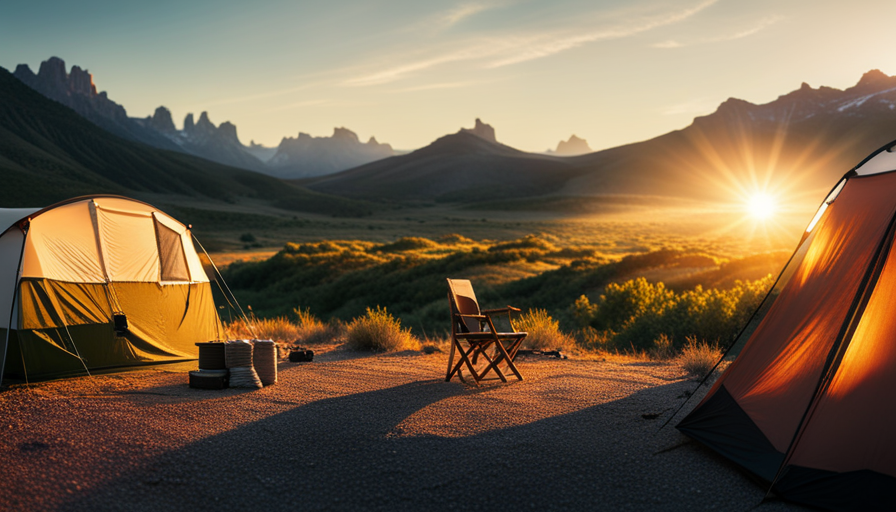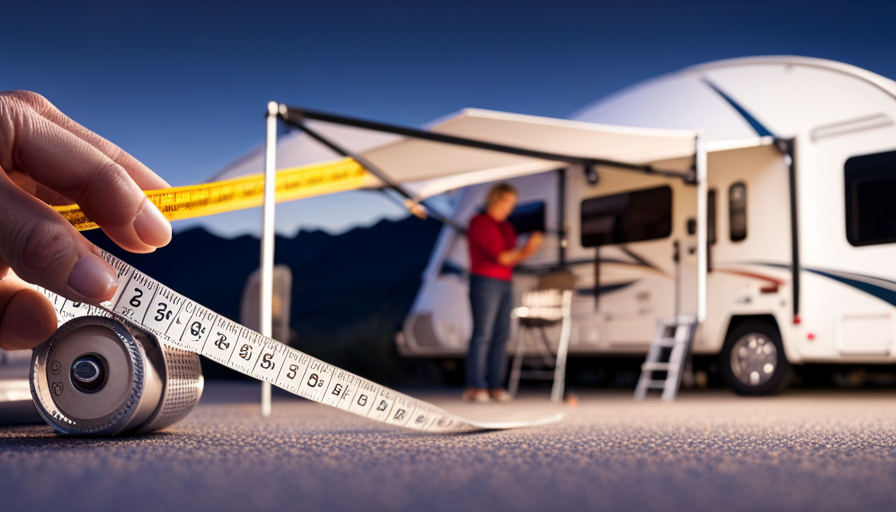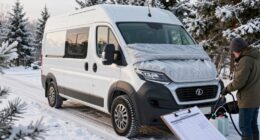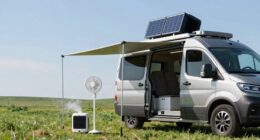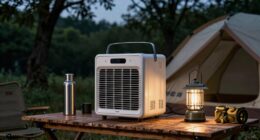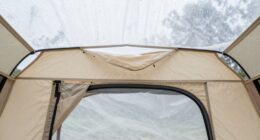Hello fellow adventurers! Ready to hit the road and begin the ultimate camping experience in your reliable camper? I have some exciting news to share with you!
In this article, I’m going to spill the beans on how to power your camper like a pro.
Now, I know what you’re thinking – powering a camper can be a real head-scratcher. But fear not, because I’ve got you covered. Whether you’re a seasoned camper or a newbie, I’m here to guide you through the ins and outs of camper power.
We’ll start by determining your power needs, because let’s face it, nobody wants to be left in the dark. Then, we’ll dive into the world of solar panels, portable generators, and power inverters – the holy trinity of camper power.
I’ll walk you through the process of harnessing battery power and optimizing energy usage, so you can make the most out of your camper’s electricity.
And that’s not all! We’ll also explore alternative power sources and discuss emergency preparedness.
So grab your notebook and get ready to become a camper power guru. Let’s make sure your camper is always powered up and ready for adventure!
Key Takeaways
- Determine power needs based on appliances and duration off-grid
- Consider solar panels and generators as options for camper power
- Proper maintenance and charging of deep-cycle batteries is essential
- Plan for emergencies and backup power options
Determine Your Power Needs
You’ll need to figure out exactly how much power you’ll need to keep your camper running smoothly. This involves considering the appliances and systems you plan to use, as well as how long you’ll be off-grid.
One option for powering your camper is solar power. Solar panels can be mounted on the roof of your camper, collecting energy from the sun and converting it into usable electricity. This is a clean and renewable source of power, perfect for those who want to minimize their environmental impact.
Another option is a generator, which can provide a reliable source of power when the sun isn’t shining or when you need to charge your batteries quickly.
When determining your power needs, it’s important to consider battery capacity planning. This involves calculating how much energy your batteries can store and how long they will last based on your power usage.
By understanding your power needs, you can make an informed decision about whether to invest in solar panels or rely on a generator.
Transitioning into the next section, investing in solar panels can provide a sustainable and long-term solution for powering your camper.
Invest in Solar Panels
When it comes to powering my camper, I’ve found that investing in solar panels has been a game changer. Not only do they provide a sustainable and environmentally friendly source of energy, but they also offer numerous benefits for campers like me.
From reducing reliance on traditional power sources to saving money on energy costs, solar panels are a must-have for any camper looking to go off-grid. However, it’s important to choose the right size and type of solar panels to ensure they meet your power needs.
Understand the benefits of solar power for campers
With solar power, campers can bask in the warm glow of the sun while their energy needs are effortlessly met. Solar panels are a great investment for campers as they provide numerous benefits.
Firstly, they eliminate the need for constant battery maintenance. Solar power keeps the camper’s batteries charged, so there’s no need to worry about running out of power during your trip.
Secondly, solar panel installation is relatively easy and can be done by anyone with basic DIY skills. Once installed, they require minimal maintenance, making them a hassle-free solution for powering your camper.
As we move on to the next section about choosing the right size and type of solar panels, it’s important to consider factors such as energy consumption and available roof space.
Choose the right size and type of solar panels
To ensure optimal energy efficiency for your camping setup, consider the size and type of solar panels that can generate an impressive 25% more electricity compared to traditional options. When it comes to solar panel installation, it’s important to choose the right size and type for your camper.
The size of the solar panels will depend on your energy needs and the available space on your camper’s roof. Monocrystalline solar panels are known for their high efficiency and durability, making them a popular choice for campers. On the other hand, polycrystalline solar panels are more affordable but slightly less efficient.
Whichever type you choose, regular solar panel maintenance is essential to ensure their longevity and efficiency. This includes cleaning the panels regularly and checking for any damage or loose connections.
With proper solar panel installation and maintenance, you can harness the power of the sun to meet your camping energy needs. Now, let’s explore how to use a portable generator to supplement your power supply.
Use a Portable Generator
When it comes to powering a camper, one option to consider is using a portable generator.
There are various types of generators available, each with their own advantages and disadvantages.
It’s important to explore these options and choose the one that best suits your needs.
Additionally, factors such as noise level and fuel efficiency should be taken into account to ensure a comfortable and efficient camping experience.
Explore the different types of generators available
Check out the variety of generators you can use to power your camper! When it comes to powering your camper, there are different types of generators to consider.
One option is solar power, which harnesses the sun’s energy to generate electricity. Solar power is clean, renewable, and quiet, making it a popular choice among campers.
Another option is wind power, which uses wind turbines to generate electricity. Wind power is also renewable, but it may not be as reliable as solar power, as it depends on the availability of wind.
On the other hand, using a generator has its own set of pros and cons. Generators are versatile and can provide power even when the sun isn’t shining or the wind isn’t blowing. However, they can be noisy and require fuel to operate. Considering the noise level and fuel efficiency is important when choosing a generator for your camper.
Transitioning into the next section, let’s now consider these factors in more detail.
Consider the noise level and fuel efficiency
When it comes to powering a camper, exploring the different types of generators available is essential. However, it’s important to also consider the noise level and fuel efficiency of the generator you choose.
Noise considerations are crucial, as you don’t want a generator that will disrupt the peace and tranquility of your camping experience. Opting for a quieter generator will ensure a more enjoyable time in nature.
Additionally, fuel consumption is an important factor to consider, especially if you plan on using the generator for extended periods. A generator that is fuel-efficient will help you save money and reduce your environmental impact.
Taking these factors into account will help you find the perfect generator for your camper.
Now, let’s transition into the next section and discuss how to install a power inverter.
Install a Power Inverter
To install a power inverter in your camper, the first step is to make sure you have a compatible inverter that can handle the electrical demands of your appliances, such as a 2000-watt inverter that can power a mini fridge for up to 5 hours. Power inverter installation tips and wiring considerations are essential to ensure a safe and efficient setup.
When selecting a power inverter, consider the total wattage of the appliances you plan to use simultaneously. Add up their individual wattage and choose an inverter with a capacity slightly higher than that total. This will prevent overloading and potential damage to the inverter. Additionally, pay attention to the inverter’s input voltage and output waveform, as these factors can affect compatibility with your camper’s electrical system.
Once you have the right inverter, you need to connect it to your camper’s battery. This requires proper wiring to ensure optimal performance and safety. Use appropriately sized cables to handle the inverter’s power output and connect them securely to the battery terminals. It is also crucial to install proper fuses or circuit breakers in the wiring to protect against overloads and short circuits.
By following these power inverter installation tips and considering wiring considerations, you can enjoy the convenience of powering your appliances while on the road. Utilize battery power to further enhance your camper’s electrical capabilities and ensure a comfortable camping experience.
Utilize Battery Power
When it comes to powering a camper, one of the key components to understand is deep-cycle batteries. These batteries are specifically designed to provide long-lasting power for extended periods of time, making them ideal for camping trips.
In order to make the most of your battery power, it’s important to know how to properly maintain and charge your batteries. This will ensure that you have a reliable source of power throughout your camping adventure.
Learn about deep-cycle batteries for campers
Deep-cycle batteries, essential for powering campers, provide a reliable source of energy while on the road. These batteries are designed to provide a steady amount of power over an extended period of time, making them perfect for camping trips.
To ensure that your deep-cycle batteries last as long as possible, it’s important to properly maintain them. This includes regularly checking the battery’s water levels, cleaning the terminals, and applying a protective coating to prevent corrosion.
Additionally, using the right battery charger is crucial for maximizing the battery’s lifespan. Slow charging at a lower amperage is recommended to avoid overcharging and damaging the battery.
By properly maintaining and charging your batteries effectively, you can ensure a long-lasting and dependable power source for your camper adventures.
Maintain and charge your batteries effectively
Make sure you properly care for and charge your batteries so they can be a reliable source of energy for your camping adventures. Battery maintenance is essential to prolong the lifespan and efficiency of your deep-cycle batteries. Regularly check the water levels in your batteries and top them off with distilled water if necessary. Inspect the battery terminals for any corrosion and clean them with a mixture of baking soda and water. To charge your batteries effectively, use a dedicated battery charger that is compatible with deep-cycle batteries. Avoid overcharging by using a smart charger that automatically adjusts the charging rate. It is also recommended to charge your batteries at a slow and steady rate to prevent damage. Additionally, consider investing in a solar panel system to keep your batteries charged while camping off-grid. Transitioning into the next section, connecting to shore power will provide another option for charging your batteries.
Connect to Shore Power
To properly connect your camper to shore power, simply plug the power cord into the designated outlet at the campground, allowing you to enjoy all the comforts of home while on your adventure.
Shore power connections are essential for maintaining a steady supply of electricity in your camper. Before connecting, make sure to check that the outlet matches your camper’s power requirements. It’s also crucial to take electrical safety precautions, such as using a surge protector to protect your camper’s electrical system from power surges or fluctuations. Additionally, ensure that the power cord is in good condition and doesn’t have any exposed wires or damage.
Once connected, you can take advantage of the shore power to charge your camper’s batteries, run appliances, and power your air conditioning or heating system. It’s important to note that while connected to shore power, your camper’s batteries will be charging automatically, so you don’t need to worry about managing them separately.
To optimize energy usage, consider using energy-efficient appliances, turning off lights and electronics when not in use, and utilizing natural ventilation instead of relying solely on air conditioning. By being mindful of your energy consumption, you can make the most out of your camper’s power supply and ensure a comfortable and enjoyable camping experience.
Optimize Energy Usage
When it comes to optimizing energy usage in a camper, there are a few key points to keep in mind. First, conserve electricity by using energy-efficient appliances. This can make a big difference in overall energy consumption.
Second, consider using LED lights and low-power devices. LED lights are much more energy-efficient than traditional incandescent bulbs, and low-power devices can help reduce the strain on your camper’s electrical system.
By implementing these strategies, you can maximize energy efficiency and make the most of your camper’s power supply.
Conserve electricity by using energy-efficient appliances
Maximize your power usage in the camper by opting for energy-efficient appliances. By following these energy-saving tips and conservation techniques, you can significantly reduce your electricity consumption and extend your camper’s battery life.
- Choose appliances with high Energy Star ratings, such as refrigerators, air conditioners, and lighting fixtures.
- Install a programmable thermostat to regulate the temperature and minimize energy wastage.
- Use a solar-powered charger for your electronic devices to save energy and harness renewable power.
- Replace regular incandescent light bulbs with energy-efficient LED lights, which consume less electricity and last longer.
- Invest in low-power devices, such as low-voltage televisions and laptops, that are specifically designed for camping.
By implementing these energy-efficient practices, you can optimize your power usage and ensure a sustainable camping experience.
Transitioning into the subsequent section, let’s explore how to further conserve electricity by using LED lights and low-power devices.
Use LED lights and low-power devices
Take advantage of LED lights and low-power devices to ensure energy efficiency and enhance your camping experience. LED lighting offers several benefits such as lower energy consumption, longer lifespan, and brighter illumination. Compared to traditional incandescent bulbs, LED lights use up to 80% less energy, reducing the strain on your camper’s electrical system. Additionally, LED lights produce less heat, making them safer to use and minimizing the risk of fire. When choosing low-power devices, opt for appliances that are specifically designed for camping or have energy-saving features. These devices consume less electricity without compromising their functionality. To provide a clearer understanding, consider the following table:
| Appliance | Power Consumption |
|---|---|
| LED Light | 5 watts |
| Portable Fan | 10 watts |
| USB Charger | 3 watts |
| Electric Stove | 1000 watts |
| Mini Fridge | 50 watts |
By utilizing LED lights and low-power devices, you can conserve electricity and make the most out of your camper’s power supply. Consider alternative power sources to further enhance your camping experience.
Consider Alternative Power Sources
When considering alternative power sources for a camper, it’s important to explore options such as wind turbines and hydroelectric systems. These renewable energy sources can provide a sustainable and environmentally friendly solution for powering a camper.
However, it’s crucial to evaluate their feasibility and cost-effectiveness, taking into account factors such as the location, installation requirements, and maintenance costs.
Explore wind turbines and hydroelectric options
Wind turbines and hydroelectric options can bring your camper to life, harnessing the power of the wind and water to create a sustainable and awe-inspiring source of energy.
With wind turbines, you can generate electricity by capturing the energy from the wind. To ensure their efficiency, regular maintenance is crucial. This includes inspecting and lubricating the moving parts, checking for any damage or wear, and cleaning the blades to maximize their performance.
On the other hand, hydroelectric power utilizes the force of flowing water to generate electricity. This can be achieved by setting up a small turbine in a nearby river or stream. Hydroelectric options are known for their high efficiency and reliability. However, it’s important to evaluate their feasibility and cost-effectiveness before making a decision. Considering factors such as the availability of wind or water resources, installation costs, and potential environmental impacts will help you determine the best power source for your camper.
Evaluate their feasibility and cost-effectiveness
To determine if wind turbines and hydroelectric options are feasible and cost-effective for you, evaluate factors like resource availability, installation costs, and potential environmental impacts. Conducting a feasibility analysis is crucial in determining whether these alternative power sources are suitable for your camper.
Consider the wind patterns in the area where you plan to park your camper and the availability of a water source for hydroelectric power. Additionally, evaluate the installation costs associated with installing wind turbines or hydroelectric systems. This includes the cost of purchasing and installing the necessary equipment.
Lastly, consider the potential environmental impacts of these power sources, such as noise pollution or disruption to local ecosystems. By conducting a thorough cost-benefit analysis, you can determine if wind turbines or hydroelectric options are the right choice for your camper.
Transitioning into the next section about planning for emergencies, it’s important to consider backup power options in case of unforeseen circumstances.
Plan for Emergencies
In case of a power outage, you can always rely on your trusty generator to magically fix everything. However, it’s important to plan for emergencies and be prepared with backup power sources. Here are some key points to consider:
-
Emergency Supplies:
- Stock up on essential supplies such as flashlights, batteries, and a first aid kit.
- Keep a supply of non-perishable food and water in case the power outage lasts for an extended period.
- Have a backup communication plan, like a portable radio or a charged cell phone.
-
Backup Power Sources:
- Invest in a reliable generator that can power your camper during emergencies.
- Determine the power needs of your camper and choose a generator with sufficient capacity.
- Consider alternative power sources such as solar panels or portable power stations for eco-friendly options.
-
Seek Professional Help:
- If you’re unsure about the right backup power solution for your camper, consult a professional.
- They can assess your power requirements, provide guidance on equipment selection, and ensure proper installation.
Planning for emergencies is crucial when it comes to powering your camper. By having emergency supplies and backup power sources in place, you can stay prepared for any unexpected power outages or situations.
Seek Professional Help
If you want peace of mind and expert guidance, it’s time to reach out to a professional for help with your backup power solution.
While DIY options may seem tempting, seeking professional advice is essential to ensure a safe and efficient power setup for your camper. A professional in the field of camper power systems will have the knowledge and experience to assess your specific needs and provide tailored recommendations.
They can guide you through the process of selecting the right power source, whether it be solar panels, generators, or a combination of both. Additionally, they can help you determine the appropriate battery capacity for your camper’s electrical demands.
Moreover, professionals can assist with the installation process, ensuring that all components are properly connected and functioning correctly. They can also advise on maintenance and troubleshooting techniques to keep your power system running smoothly.
While DIY options may be tempting for cost-saving purposes, it’s important to consider the potential risks involved. A professional can help you avoid common pitfalls and prevent damage to your camper or electrical system.
When it comes to powering your camper, seeking professional help is crucial. Their expertise and guidance will provide you with a reliable and safe backup power solution, giving you peace of mind during your camping adventures.
Frequently Asked Questions
How much does it cost to install solar panels on a camper?
Installing solar panels on a camper can vary in cost depending on factors such as panel size, quality, and installation fees. However, the benefits outweigh the drawbacks. Solar panels provide a cost-effective and environmentally friendly way to power your camper. They can save you money on electricity bills and reduce your carbon footprint. While the initial investment may seem high, the long-term savings and independence from traditional power sources make it a worthwhile investment.
What is the average lifespan of a portable generator?
The average lifespan of a portable generator depends on various factors such as usage, maintenance, and quality. Generally, a well-maintained generator can last anywhere from 1,000 to 10,000 hours. Regular maintenance is crucial to ensure longevity.
Here are some tips:
- Change oil regularly.
- Keep it clean.
- Check and replace spark plugs as needed.
- Store it properly when not in use.
Following these maintenance tips can extend the lifespan of your generator.
Can a power inverter be used to power all appliances in a camper?
A power inverter can be used to power some appliances in a camper, but it has limitations. It converts DC power from the camper’s battery into AC power for appliances. However, the size and capacity of the power inverter determine what it can power. High-power appliances like air conditioners or large heaters may exceed the inverter’s capacity. In these cases, alternative power sources like a generator or shore power may be needed.
How long can a camper run solely on battery power?
When it comes to running a camper solely on battery power, it’s like embarking on a road trip with a limited fuel tank. The battery capacity determines how long you can go before needing a recharge.
Maximizing battery life involves being mindful of energy usage, such as turning off lights and appliances when not in use.
Depending on your camper’s battery capacity and usage, you may get anywhere from a few hours to several days of power before needing to recharge.
Are there any safety precautions to consider when connecting a camper to shore power?
When connecting a camper to shore power, there are several important safety measures to consider. Firstly, ensure that the electrical connections are secure and free from any damage. It’s crucial to use a properly rated and grounded power cord to prevent electrical hazards.
Additionally, make sure to use a surge protector to protect the camper’s electrical system from power surges. Regularly inspect the connections and cords for any signs of wear and tear to prevent potential accidents.
Conclusion
Well folks, after reading this detailed guide on how to power a camper, you’ll be a true power guru! By investing in solar panels and utilizing battery power, you’ll be harnessing the sun’s energy like a superhero.
And don’t forget about the trusty portable generator and power inverter, which will have you feeling like a wizard with unlimited power at your fingertips.
With these tips and tricks, you’ll be the envy of every camper out there. So go forth and conquer the great outdoors with your unstoppable power supply!

